不定代词、副词用法巧归纳
(完整版)不定代词用法一览表
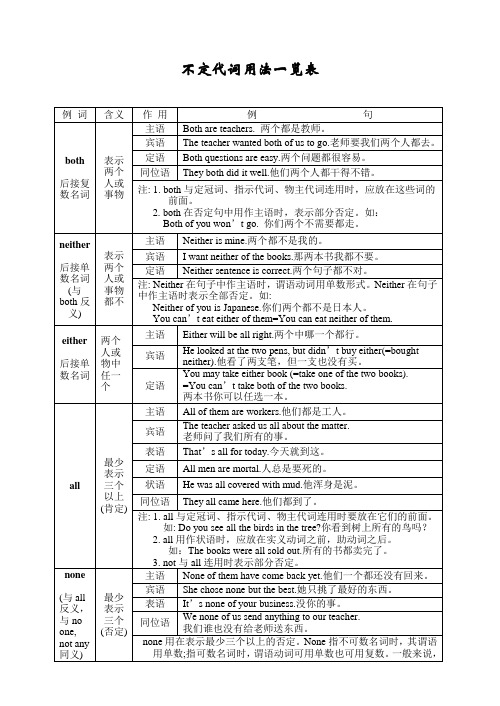
不定代词用法一览表不定代词不是指明代替任何特定名词的代词叫做不定代词。
常见的不定代词有all,both,each,every,some,any,many,much,(a)few,(a)little,one,ones,either,neither,other,another,no,none以及含有some-,any-,no-等的合成代词(如:anybody,something,no one)。
这些不定代词大都可以代替名词和形容词,在句中作主语、宾语、表语和定语。
但none和由some,any,no,every+thing,-body,-one构成的复合不定代同(如somebody等)只能作主语、宾语或表语;every和no只能作定语。
(这些词作定语时,有些语法书称之为形容词)下面我们把一些主要的不定代词用法归纳如下:one的用法1.one(一个),可以指人,也可以指物。
在句中可作主语、宾语和定语。
One should not praise oneself. 一个人不应炫耀自己。
(one作主语和宾语)If one wants to visit the city,one must find one’s own guide.如要参观这个城市,得自己找向导。
2.one,ones(one的复数形式)可用来代替前面出现过的少数名词,以避免重复。
Do you have a car?Yes,I have one. 你有一辆小汽车吗?是的,我有一辆。
I like small cars better than large ones. 我喜欢小汽车,不喜欢大汽车。
3.one的前面可用this,that,the,which等词修饰。
There are three pens,which one is yours,this one or that one or the one in the pencil-box?这儿有三支钢笔,哪一支是你的?这支?那支?还是在铅笔盒里的那支?4.a+形容词+one这一形式,经常见到或使用。
不定代词和不定副词

不定代词和不定副词 SANY GROUP system office room 【SANYUA16H-不定代词和不定副词的构成及其用法1.构成:由some, any, no, every分别加上-body, -thing, -one构成的不定代词叫做合成不定代词;加上-where构成副词。
2.用法:(1)合成不定代词在句中可以作主语,宾语或表语等。
Nobody will listen to him.He wants something to eat.(2)不定代词作主语时,谓语动词要用单数。
There is nothing wrong with the TV.Everybody likes to be free.(3)some-不定代词,通常用于肯定句中;any-不定代词则多用于否定句、疑问句和条件状语从句中。
但some-可用于表请求、邀请、预料对方会作肯定回答时的疑问句中。
Someone called on her last week.There isn’t anyone else there.Is anybody over there?Could you give me something to eat?(4)形容词修饰不定代词时,通常要放在不定代词之后。
There is something wrong with your eyes.(5)somewhere, anywhere, nowhere, everywhere用作副词。
Trees turn green and flowers come out everywhere.4.巩固练习:用不定代词或不定副词填空:1. I can’t hear anything = I can hear _________.2. There is __________ on the floor. Please pick it up.3. Did _____ go to play basketball with you ?4. I phoned you last night, but ________ answered it.5. I don’t think ___________ telephoned.6. Why don’t you ask _________ to help you ?7. If you want __________ , please let me know.8. Shall we get _________ to drink ?9. Don’t worry. There’s ______ wrong with your ears.10. There’s __________ in the box.It’s empty.11. Maybe __________put my pencil _________. I can’t find it___________.。
不定代词enough的用法总结
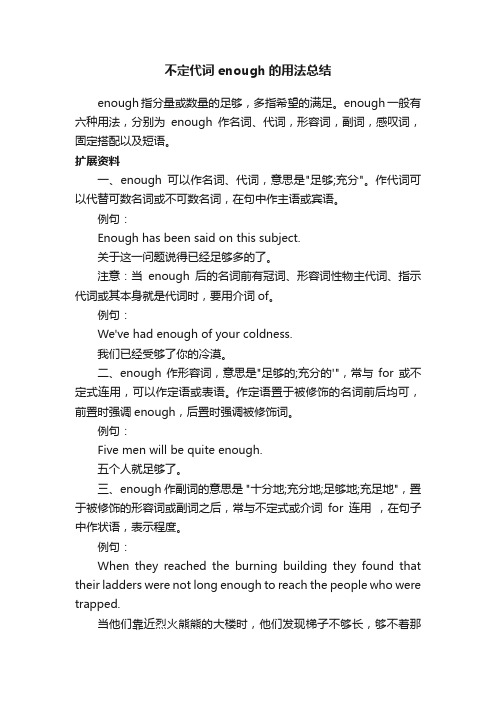
不定代词enough的用法总结enough指分量或数量的足够,多指希望的满足。
enough一般有六种用法,分别为enough作名词、代词,形容词,副词,感叹词,固定搭配以及短语。
扩展资料一、enough可以作名词、代词,意思是"足够;充分"。
作代词可以代替可数名词或不可数名词,在句中作主语或宾语。
例句:Enough has been said on this subject.关于这一问题说得已经足够多的了。
注意:当enough后的名词前有冠词、形容词性物主代词、指示代词或其本身就是代词时,要用介词of。
例句:We've had enough of your coldness.我们已经受够了你的冷漠。
二、enough作形容词,意思是"足够的;充分的'",常与for或不定式连用,可以作定语或表语。
作定语置于被修饰的名词前后均可,前置时强调enough,后置时强调被修饰词。
例句:Five men will be quite enough.五个人就足够了。
三、enough作副词的意思是 "十分地;充分地;足够地;充足地",置于被修饰的形容词或副词之后,常与不定式或介词for连用,在句子中作状语,表示程度。
例句:When they reached the burning building they found that their ladders were not long enough to reach the people who were trapped.当他们靠近烈火熊熊的大楼时,他们发现梯子不够长,够不着那些被火围困的人。
四、enough作感叹词时意思是"够了;停止;住手;不要再继续了",用以表达不耐烦或恼怒。
例句:You've been practising the violin all afternoon. Enough!你整个下午都在练小提琴。
不定代词和不定副词的用法总结(精选五篇)
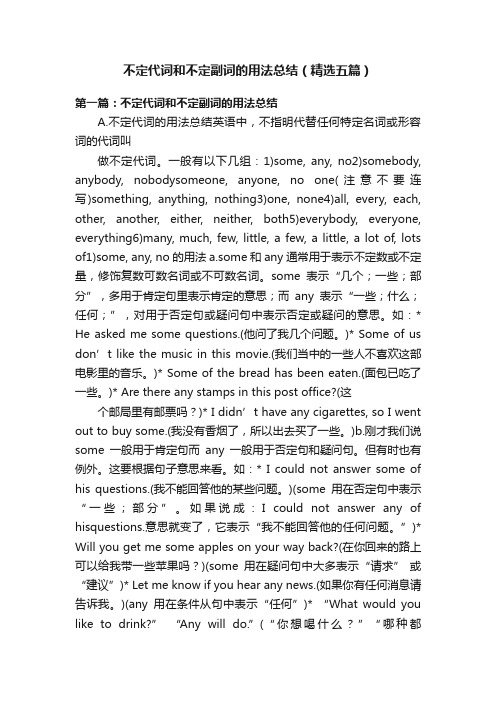
不定代词和不定副词的用法总结(精选五篇)第一篇:不定代词和不定副词的用法总结A.不定代词的用法总结英语中,不指明代替任何特定名词或形容词的代词叫做不定代词。
一般有以下几组:1)some, any, no2)somebody, anybody, nobodysomeone, anyone, no one(注意不要连写)something, anything, nothing3)one, none4)all, every, each, other, another, either, neither, both5)everybody, everyone, everything6)many, much, few, little, a few, a little, a lot of, lots of1)some, any, no的用法a.some和any通常用于表示不定数或不定量,修饰复数可数名词或不可数名词。
some表示“几个;一些;部分”,多用于肯定句里表示肯定的意思;而any表示“一些;什么;任何;”,对用于否定句或疑问句中表示否定或疑问的意思。
如:* He asked me some questions.(他问了我几个问题。
)* Some of us don’t like the music in this movie.(我们当中的一些人不喜欢这部电影里的音乐。
)* Some of the bread has been eaten.(面包已吃了一些。
)* Are there any stamps in this post office?(这个邮局里有邮票吗?)* I didn’t have any cigarettes, so I went out to buy some.(我没有香烟了,所以出去买了一些。
)b.刚才我们说some一般用于肯定句而any一般用于否定句和疑问句。
但有时也有例外。
这要根据句子意思来看。
不定代词用法归纳总结知乎
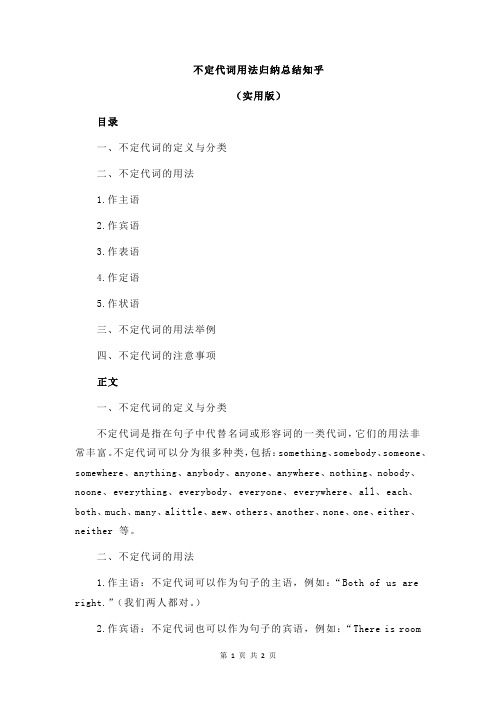
不定代词用法归纳总结知乎(实用版)目录一、不定代词的定义与分类二、不定代词的用法1.作主语2.作宾语3.作表语4.作定语5.作状语三、不定代词的用法举例四、不定代词的注意事项正文一、不定代词的定义与分类不定代词是指在句子中代替名词或形容词的一类代词,它们的用法非常丰富。
不定代词可以分为很多种类,包括:something、somebody、someone、somewhere、anything、anybody、anyone、anywhere、nothing、nobody、noone、everything、everybody、everyone、everywhere、all、each、both、much、many、alittle、aew、others、another、none、one、either、neither 等。
二、不定代词的用法1.作主语:不定代词可以作为句子的主语,例如:“Both of us are right.”(我们两人都对。
)2.作宾语:不定代词也可以作为句子的宾语,例如:“There is roomfor all of us.”(我们所有的人全坐得下。
)3.作表语:不定代词可以作为句子的表语,例如:“That"s nothing.”(没什么。
)4.作定语:不定代词可以作为句子的定语,例如:“You may take either road.”(两条路你走哪条都行。
)5.作状语:不定代词可以作为句子的状语,例如:“I can"t find my book anywhere.”(我在任何地方都不能找到我的书。
)三、不定代词的用法举例以下是一些不定代词在句子中的实际用法举例:- Both of them are teachers.(他们两人都是教师。
)- I know nothing about this person.(我对这个人一无所知。
)- This book is too much difficult for a child.(这本书对一个小孩来说太难了。
不定代词的用法

不定代词定义: 不定代词是不指明代替任何特定名词或形容词的代词。
一、复合不定代词1.It’s rainning outside, so we can go nowhere/ so we can’t go anywhere.2.I looked for my wallet everywhere, but I can’t find it.3.There is nothing wrong with leg, so don’t worry about it anymore./ There is n’t anything wrong with my leg.1. 复合不定代词做主语,谓语动词做单数。
How is everything with you?No one/ Nobody ____likes____(like) this book.2. 当形容词以及else修饰复合不定代词或复合不定副词时,形容词以及else要后置。
There is no one else around.Something importantAnything usual4.Any/ any-等常常用语否定句和疑问句Is there anything wrong?/ I don’t want to tell you anything. Some/ some-常位于肯定句以及表示温婉请求的疑问句中Would you like something to eat?二、none, no one, nobody, nothing--None. They are in the lab.--Who is in the classroom now?---No one./ Nobody.2.Nobody likes to be mafe fun of. 没有人喜欢被取笑。
3.It is nothing serious. I just have a cold. 没什么严重的事。
完整版)不定代词用法总结
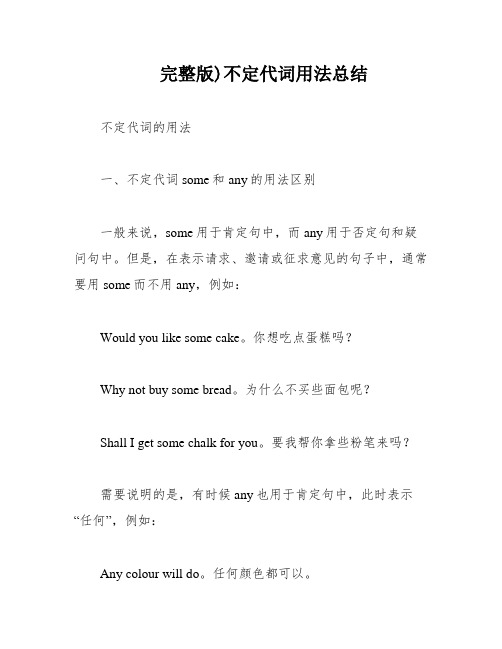
完整版)不定代词用法总结不定代词的用法一、不定代词some和any的用法区别一般来说,some用于肯定句中,而any用于否定句和疑问句中。
但是,在表示请求、邀请或征求意见的句子中,通常要用some而不用any,例如:Would you like some cake。
你想吃点蛋糕吗?Why not buy some bread。
为什么不买些面包呢?Shall I get some chalk for you。
要我帮你拿些粉笔来吗?需要说明的是,有时候any也用于肯定句中,此时表示“任何”,例如:Any colour will do。
任何颜色都可以。
Come any day you like。
你随便哪天来都可以。
二、不定代词many和much的用法以及区别不定代词many和much都表示“许多”,但many修饰或代替可数名词(复数),与few(少数)相对;而much用来修饰或代替不可数名词(单数),与little(少量)相对。
在口语中,两者主要用于非肯定句中,例如:Did you see many people there。
你在那儿看见许多人了吗?We don’t have much time。
我们没有许多时间。
XXX work has been done。
许多工作都已经做了。
You’ve given me too much。
你给我太多了。
Take as many (much) as you want。
你要多少拿多少。
I asked her a great many ns。
我问了她许多问题。
另外需要注意的是,too much可以作副词或代词,也可以用作形容词修饰不可数名词,例如:Is watching TV too much good or bad for your health。
看电视太多对你的健康有益还是有害?You’ve given me too much。
你给我的太多了。
We’ve had too much rain lately。
不定代词和不定副词
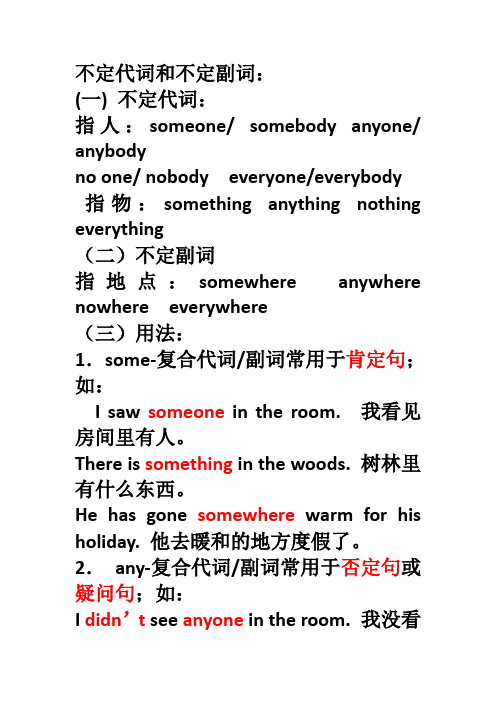
不定代词和不定副词:(一) 不定代词:指人:someone/ somebody anyone/ anybodyno one/ nobody everyone/everybody 指物:something anything nothing everything(二)不定副词指地点:somewhere anywhere nowhere everywhere(三)用法:1.some-复合代词/副词常用于肯定句;如:I saw someone in the room. 我看见房间里有人。
There is something in the woods. 树林里有什么东西。
He has gone somewhere warm for his holiday. 他去暖和的地方度假了。
2.any-复合代词/副词常用于否定句或疑问句;如:I didn’t see anyone in the room. 我没看见有人在房间里。
There isn’t anything in the woods. 树林里没有什么东西。
He hasn’t gone anywhere warm for his holiday.他没去暖和的地方度假。
3.no- 复合代词/副词表全否定;如:I saw nobody in the room. 我看见房间里没有人。
There is nothing in the woods. 树林里没有什么东西。
4.every- 复合代词/副词代替全部;如:Everyone is here. 大家都在这儿。
It seems he knows everything. 似乎他知道一切。
some-复合代词/副词用于疑问句中时,表希望得到对方的肯定回答或表请求;如:Would you like something to drink?你要点喝的东西吗?any-复合代词/副词用于肯定句时,表“任何”;如:If people spit anywhere in public, theyshould be punished.如果人们在公众的任何地方吐痰,他们应该受罚。
- 1、下载文档前请自行甄别文档内容的完整性,平台不提供额外的编辑、内容补充、找答案等附加服务。
- 2、"仅部分预览"的文档,不可在线预览部分如存在完整性等问题,可反馈申请退款(可完整预览的文档不适用该条件!)。
- 3、如文档侵犯您的权益,请联系客服反馈,我们会尽快为您处理(人工客服工作时间:9:00-18:30)。
一、构成
不定代词、副词是由some, any, no, every与thing, one, body, where 等构成。
例如:something, someone, nowhere, anybody等。
二、用法
1.通常情况下,由some, every加后缀构成的不定代词、副词常用于肯定句;由any加后缀构成的不定代词、副词常用于疑问句、否定句中。
例如:
(1)You will find your bag somewhere. 你将在某个地方找到你的背包。
(2)Can you hear anything? 你能听见什么吗?
注意:当说话人希望得到肯定答复,或是表示建议、请求等意图时,something, somebody, someone也可以用于疑问句中。
当要表达“任何人;任何事物”时,anything, anybody, anyone也可以用于肯定句中。
例如:
(1)Would you like something to drink? 你想要喝点什么吗?
(2)Anybody can do it except Tom. 除了汤姆,任何人都会做。
2. nobody, no one, nothing等词表示否定时,分别相当于not anybody, none, not anything 。
例如:
There isn't anybody in this room.= There is nobody in this room. 房间里没有人。
3.不定代词、副词被形容词、动词不定式修饰时,形容词、动词不定式一般都置于不定代词、副词之后。
例如:
(1)There is nothing wrong with your eyes. 你的眼睛没有问题。
(2)I have something important to tell you. 我要告诉你一些重要的事。
4.不定代词作主语时,谓语动词一般要用单数形式。
例如:
Everybody likes to be free. 人人都爱自由。
5.在反意疑问句中,若陈述句的主语是表示物的不定代词,其附加疑问句的主语用it;若陈述部分的主语是表示人的不定代词时,其附加疑问句的主语在正式文体中常用he,在非正式文体中常用they。
例如:
Nobody likes apples, does he / do they?。
